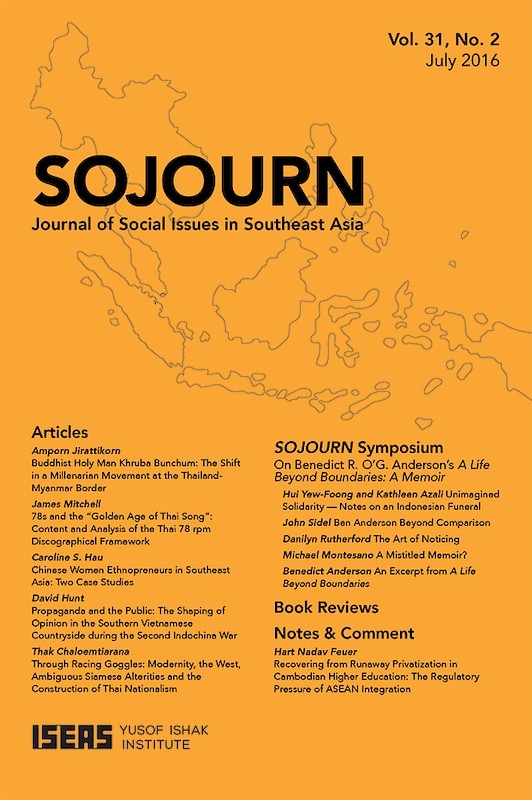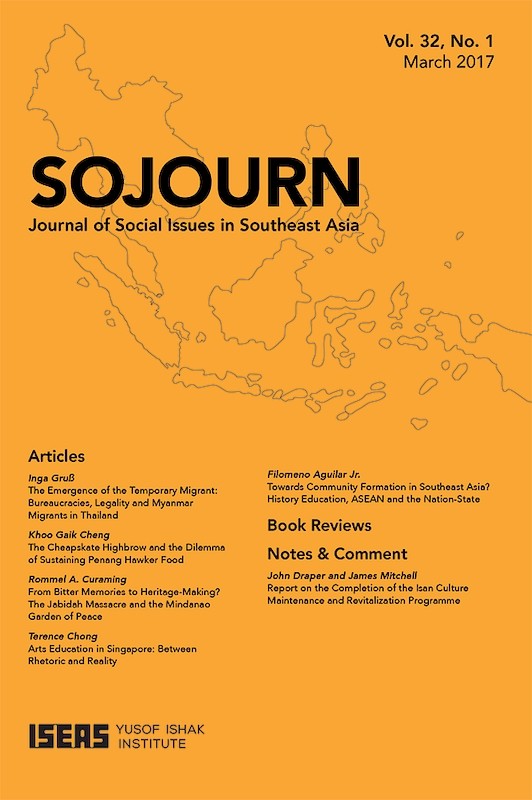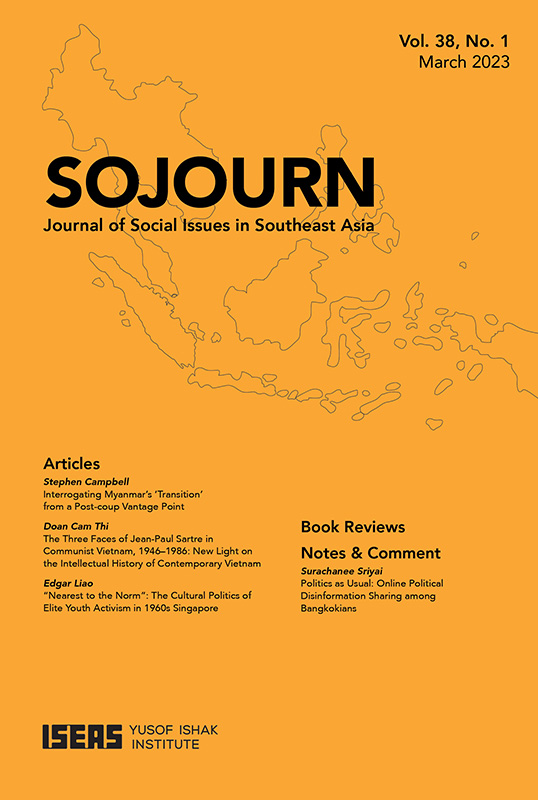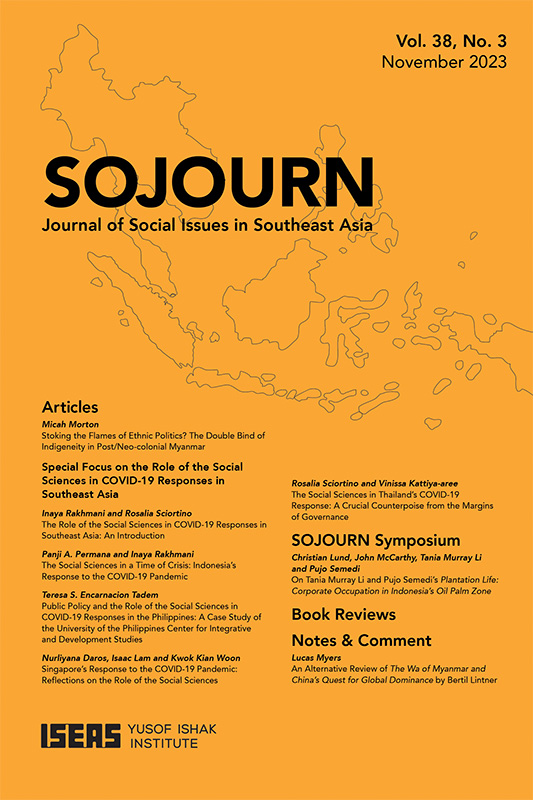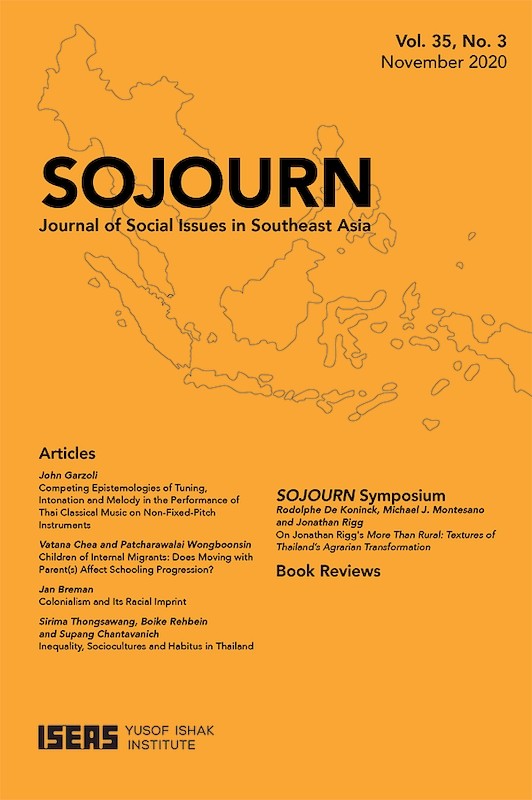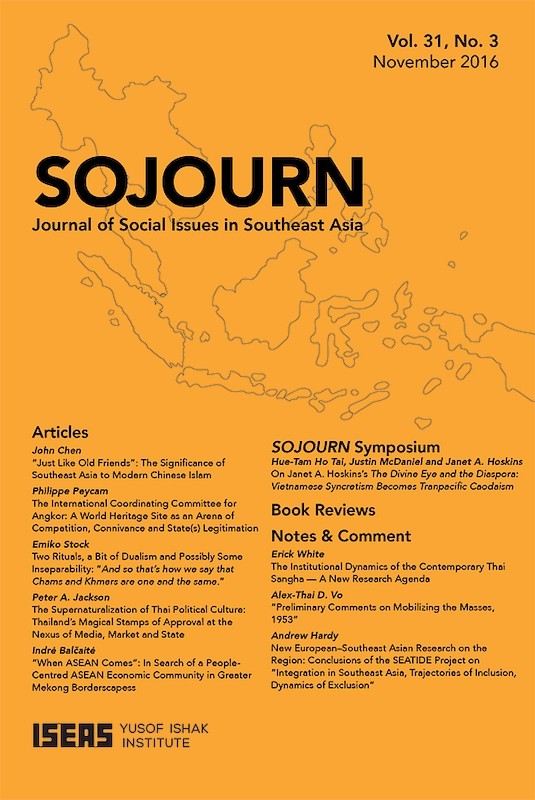SOJOURN: Journal of Social Issues in Southeast Asia Vol. 33/3 (November 2018)
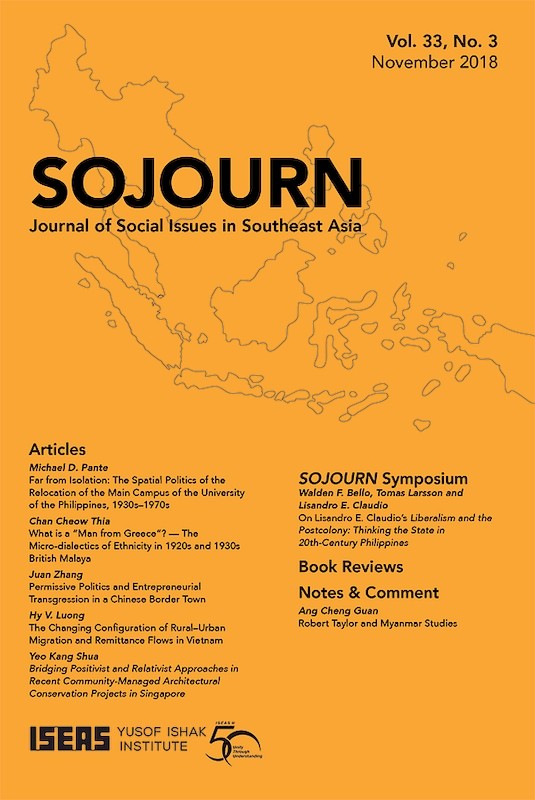
Date of publication:
November 2018
Publisher:
ISEAS – Yusof Ishak Institute
Number of pages:
257
Code:
SJ33/3
Contents
-
SOJOURN: Journal of Social Issues in Southeast Asia Vol. 33/3 (November 2018)
[Whole Publication, ISSN: 17932858] -
Preliminary pages
- ARTICLES
-
Far from Isolation: The Spatial Politics of the Relocation of the Main Campus of the University of the Philippines, 1930s–1970s, by Michael D. Pante, author see abstractThe first campus of the University of the Philippines, which was founded in 1908, was located in Ermita, Manila. Three decades later, its location in the rapidly urbanizing and politically volatile capital led university and government officials to move the university to Diliman in suburban Quezon City, a site that embodied the university town archetype. While the new campus conformed to the university town template, Quezon City’s income-poor communities proved significant in radicalizing students, thereby undermining the original intention behind Diliman. Attention to the peculiar historical geography of the main campus of the University of the Philippines has potential to serve as the start of a conversation on the socio-spatial relations between universities and Southeast Asian cities.
-
What is a “Man from Greece”? — The Micro-dialectics of Ethnicity in 1920s and 1930s British Malaya, by Cheow Thia Chan , author see abstractScholars such as G. William Skinner and Charles Hirschman have produced trenchant analyses of ethnicity in Malaya based on aggregated demographic data. Yet subjective attitudes towards ethnic identification within and among different social groups remain inadequately examined. The 1937 Chinese-language short story “<i>Xila Ren</i>” (The Man from Greece) serves as an example of what O.W. Wolters calls “local cultural statements”. Analysis of that statement makes it possible to expound “micro-dialectics” of Chinese ethnic self-understandings in British Malaya in the late 1920s and early 1930s. These micro-dialectics elicit the finer stratifications of a creolized Chinese society beyond the Straits Settlements by analysing a meeting between a newcomer from China and an elderly Chinese migrant who has adopted the Islamic faith. In the literary text studied here, the Chinese Muslim says that Malays call him “the man from Greece”. Evoking discordant views about the anomalous ethno-social status of Chinese Muslims in the locality, the conversation uncovers a grass-roots archive of lexical terms for ethnic classification that strays from colonial census categories. Arguably, the appellation “the man from Greece” arises from undepicted quotidian Sino-Malay encounters that involve a strategic equivalence of place-names. The word play implies a folk taxonomy of places mobilized by Malays to differentiate between Chinese who were Muslim from birth and those who later converted to Islam. In turn, the Chinese Muslim convert appropriates the “Greek” affiliation to counter the newcomer’s didactic enframing of him as a “man from China”. Highlighting situational performances of identity within interethnic as well as intra-ethnic contexts, “The Man from Greece” offers insights into historical circumstances that complicate the entanglement of Chineseness and Muslimness in Malaya, and foregrounds place-based expressions of social belonging.
-
Permissive Politics and Entrepreneurial Transgression in a Chinese Border Town, by Juan Zhang, author see abstractContemporary experiences of Han Chinese traders in Hekou, a remote town on the China-Vietnam border inform discussions of permissive politics and entrepreneurial transgression at the peripheries of the state. Permissive politics facilitates the transnational movement of goods across national borders in both formal and informal ways. Examination of cross-border smuggling as both an everyday strategy of profit-making and an act of ordinary transgression clarifies the ways in which borderland permissiveness normalizes and even rewards certain unauthorized practices on the part of traders, vendors and individuals who undertake entrepreneurial activities.
-
The Changing Configuration of Rural–Urban Migration and Remittance Flows in Vietnam, by Hy V Luong, author see abstractThe literature on domestic migration and remittances in developing countries has focused heavily on the acceleration of rural-to-urban migration and the one-way flow of remittances to migrants’ rural families. A longitudinal and panel study of seven rural communities in three regions of Vietnam discovers a changing configuration of domestic migration and remittance flows in the country that is not easy to detect from national aggregate statistics. Numerous migrants from rural communities in the Red River Delta in the North and Mekong Delta in the South have returned home, migration in pursuit of education has increased, and remittance flows have become multidirectional. This changing configuration has to do not only with migrants’ calculation of economic costs and benefits but also with a socioculturally constructed web of moral obligations to family members.
-
Bridging Positivist and Relativist Approaches in Recent Community-Managed Architectural Conservation Projects in Singapore, by Yeo Kang Shua, author see abstractOver the course of the past decade, architectural conservation in Singapore has moved beyond the prevailing “3R Principle” of “Maximum Retention, Sensitive Restoration and Careful Repair” formulated by the Urban Redevelopment Authority in the 1980s towards a more nuanced understanding of conservation. The former principle was grounded in a positivist construction of historical “truth” that is substantiated by the historic fabric of a building. It grew out of an intellectual tradition set out in conservation charters dating from the period between the 1870s and the 1960s. Since the 1970s, however, postmodern relativism has increasingly influenced the heritage field worldwide. Recent conventions advocate a more fluid understanding of authenticity that takes local cultural contexts into account. In Singapore, this shift has become evident in recent institutional projects, particularly in the conservation and restoration of religious buildings. Recent community-owned architectural conservation projects suggest the reasons for this shift.
- SOJOURN SYMPOSIUM
-
On Liberalism and the Postcolony: Thinking the State in 20th-Century Philippines by Lisandro E. Claudio, by Walden F Bello , Tomas Larsson, Lisandro Claudio, authors
- BOOK REVIEWS
-
BOOK REVIEW: Chinese in Colonial Burma: A Migrant Community in a Multiethnic State, by Yi Li, by Wen-Chin Chang, author
-
BOOK REVIEW: Writing the South Seas: Imagining the Nanyang in Chinese and Southeast Asian Postcolonial Literature, by Brian C. Bernards, by Tamara Silvia Wagner, author
-
BOOK REVIEW: Southeast Asia in Ruins: Art and Empire in the Early 19th Century, by Sarah Tiffin, by Hélène Njoto, author
-
BOOK REVIEW: Thai Art: Currencies of the Contemporary, by David Teh, by Clare Veal, author
-
BOOK REVIEW: Imperial Intoxication: Alcohol and the Making of Colonial Indochina, by Gerard Sasges, by Eric Jennings, author
-
BOOK REVIEW: Violent Neoliberalism: Development, Discourse, and Dispossession in Cambodia, by Simon Springer, by Anne Hennings, author
-
BOOK REVIEW: Challenging Malaysia’s Status Quo, by Lim Teck Ghee, by Carl Vadivella Belle, author
- NOTES & COMMENT
-
Robert Taylor and Myanmar Studies, by Ang Cheng Guan, author see abstractFor more than half a century, Professor Robert Taylor has written extensively on the modern history and politics of Burma and subsequently Myanmar. A beginner student’s first encounter with Robert Taylor is most likely to come through reading the second edition of In Search of Southeast Asia (1987) and The State in Burma (1987). These books are just two of his many works on the country to which he has devoted his scholarly career. A survey of Professor Taylor’s writings from the 1970s to the present permits assessment of his contribution to the field of Myanmar studies.

